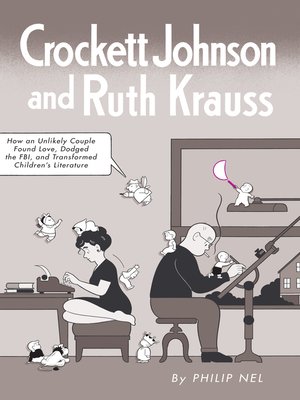Crockett Johnson and Ruth Krauss
ebook ∣ How an Unlikely Couple Found Love, Dodged the FBI, and Transformed Children's Literature · Children's Literature Association
By Philip Nel

Sign up to save your library
With an OverDrive account, you can save your favorite libraries for at-a-glance information about availability. Find out more about OverDrive accounts.
Find this title in Libby, the library reading app by OverDrive.



Search for a digital library with this title
Title found at these libraries:
| Loading... |
Winner of the Children's Literature Association's 2014 Honor Book Award
Crockett Johnson (born David Johnson Leisk, 1906–1975) and Ruth Krauss (1901–1993) were a husband-and-wife team that created such popular children's books as The Carrot Seed and How to Make an Earthquake. Separately, Johnson created the enduring children's classic Harold and the Purple Crayon and the groundbreaking comic strip Barnaby. Krauss wrote over a dozen children's books illustrated by others, and pioneered the use of spontaneous, loose-tongued kids in children's literature. Together, Johnson and Krauss's style—whimsical writing, clear and minimalist drawing, and a child's point-of-view—is among the most revered and influential in children's literature and cartooning, inspiring the work of Maurice Sendak, Charles M. Schulz, Chris Van Allsburg, and Jon Scieszka.
This critical biography examines their lives and careers, including their separate achievements when not collaborating. Using correspondence, sketches, contemporary newspaper and magazine accounts, archived and personal interviews, author Philip Nel draws a compelling portrait of a couple whose output encompassed children's literature, comics, graphic design, and the fine arts. Their mentorship of now-famous illustrator Maurice Sendak (Where the Wild Things Are) is examined at length, as is the couple's appeal to adult contemporaries such as Duke Ellington and Dorothy Parker. Defiantly leftist in an era of McCarthyism and Cold War paranoia, Johnson and Krauss risked collaborations that often contained subtly rendered liberal themes. Indeed, they were under FBI surveillance for years. Their legacy of considerable success invites readers to dream and to imagine, drawing paths that take them anywhere they want to go.
Crockett Johnson (born David Johnson Leisk, 1906–1975) and Ruth Krauss (1901–1993) were a husband-and-wife team that created such popular children's books as The Carrot Seed and How to Make an Earthquake. Separately, Johnson created the enduring children's classic Harold and the Purple Crayon and the groundbreaking comic strip Barnaby. Krauss wrote over a dozen children's books illustrated by others, and pioneered the use of spontaneous, loose-tongued kids in children's literature. Together, Johnson and Krauss's style—whimsical writing, clear and minimalist drawing, and a child's point-of-view—is among the most revered and influential in children's literature and cartooning, inspiring the work of Maurice Sendak, Charles M. Schulz, Chris Van Allsburg, and Jon Scieszka.
This critical biography examines their lives and careers, including their separate achievements when not collaborating. Using correspondence, sketches, contemporary newspaper and magazine accounts, archived and personal interviews, author Philip Nel draws a compelling portrait of a couple whose output encompassed children's literature, comics, graphic design, and the fine arts. Their mentorship of now-famous illustrator Maurice Sendak (Where the Wild Things Are) is examined at length, as is the couple's appeal to adult contemporaries such as Duke Ellington and Dorothy Parker. Defiantly leftist in an era of McCarthyism and Cold War paranoia, Johnson and Krauss risked collaborations that often contained subtly rendered liberal themes. Indeed, they were under FBI surveillance for years. Their legacy of considerable success invites readers to dream and to imagine, drawing paths that take them anywhere they want to go.






